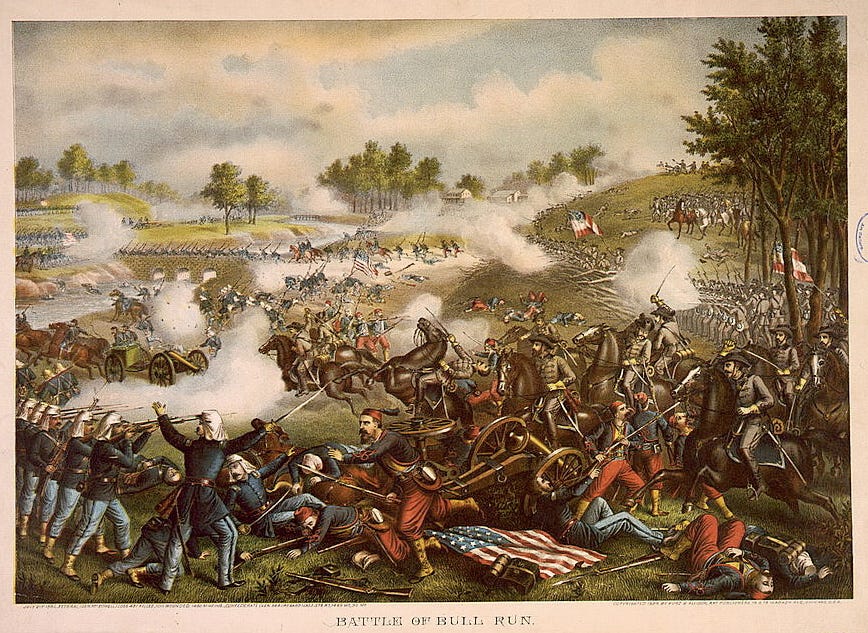TDIH: The Crittenden-Johnson Resolution
The official purpose of the Civil War, Congress had decided, was to defend the Constitution and to hold the Union together, not to abolish slavery.
On this day in 1861, the U.S. Senate approves the Crittenden-Johnson Resolution, a version of which had already been approved by the House. The official purpose of the Civil War, Congress had decided, was to defend the Constitution and to hold the Union together, not to abolish slavery.
The war, congressional members agreed, was not being waged for “purpose of overthrowing or interfering with rights or established institutions of those [southern] States.” Instead, the single purpose was to “defend and maintain the supremacy of the Constitution . . . and to preserve the Union.”
The “established institutions of those States,” of course, was a reference to slavery.
But what had prompted the House and Senate to act in the first place? Their resolutions came just three months after the first shots of the Civil War and mere days after the war’s first major battle: The First Battle of Bull Run had ended with a startling Confederate victory. It left Northerners nervous. Would the war drag on longer than anticipated? Many Northerners were against slavery, but they weren’t ready to endure a protracted, bloody war over it, either.
Complicating matters still more, many feared that Missouri, Kentucky, and Maryland could still secede. All three states sat on the border between North and South—and all three were slaveholding states.
Would they stay with the Union or would they join the Confederacy?
Naturally, it was a bit of a dilemma. Abraham Lincoln and Congress had to figure out how to consolidate and solidify support for a military effort, even as they kept a handful of Northern slaveholding states in the Union. An emphasis on antislavery sentiment was not going to help. Instead, the American government remained fairly neutral on slavery. The focus was on restoring the Union.
“In the early stages of the Civil War,” one historian concludes, “the theme of preserving, not changing, the old Union of 1860 was absolutely essential to creating and maintaining Northern unity. By affirming that theme in the Johnson-Crittenden Resolutions, Congress laid out the broadest possible political platform on which all Northerners could stand in support of the Union war effort. . . . destruction of slavery was not to be a war objective.”
The resolution echoed sentiments that Abraham Lincoln would later express in a letter to newspaper editor Horace Greeley: “My paramount object in this struggle is to save the Union, and is not either to save or to destroy slavery. If I could save the Union without freeing any slave I would do it, and if I could save it by freeing all the slaves I would do it . . . .”
But if the North was divided in their sentiments, so was the South. True, some state secession ordinances had mentioned slavery as a cause for leaving, but other states had unequivocally rejected such an idea. As a result, as historian James McPherson notes, “an explicit avowal that the defense of slavery was a primary Confederate war aim might have proven more divisive than unifying in the South. Both sides, therefore, shoved slavery under the rug as they concentrated their energies on mobilizing eager citizen soldiers and devising strategies to use them.”
None of this history definitively answers the question that is so often asked in modern-day America: “Was the Civil War about slavery?” But it does suggest that any definitive answer about the causes of the Civil War is complicated, at best.
P.S. The painting is of the First Battle of Bull Run.
Sources can always be found on my website, here.





War is hell. Was this the righteous war it was claimed to be? I feel many of the South and their agrarian culture saw the problems with taxation they were experiencing that little effected states of the North. It was a serious problem. Yet, the issue that precipitated for the southern states to begin to secede was the election of Lincoln who basically ran on an anti-slavery/abolishment platform. Although the North tried to decorate the issue with this clever resolution, the issue at heart was slavery and the South wanted to handle it on their own terms without being forced. But, they pushed the issue and started a war. I still am inclined to think that the Civil War was more of what Peter Marshall described in The Light and the Glory," which is that the Civil War was God's judgment on this American nation for not dealing with slavery when there had been plenty of opportunity. It make one think...
Thanks for sharing this, Tara Ross. This contains very legitimate questions about our history.
State's rights are extremely important, but the union of those states is what keeps us a power to be considered on the world stage. We are coming dangerously close to seeing another struggle in this mean. Pray for God's guidance!